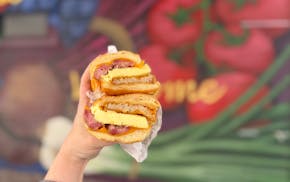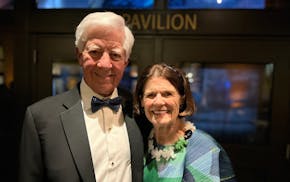This time of year, we can't get enough of baking.
Perhaps it's the cold, short days that make us gravitate toward the kitchen. Or maybe it's because we are conditioned to bake during the holiday season and butter is nearly always on sale.
It could also be that this year's crop of baking books is too good to pass up. In addition to the local trio of baking books making a splash — "The Ultimate Minnesota Cookie Book" from Rick Nelson and Lee Svitak Dean; "100 Afternoon Sweets" by Sarah Kieffer and "Zoë Bakes Cookies" from Zoë François — there are a handful of others that belong in your culinary library.
From grown-up chocolate pudding to gluten-free toffee cake, continue scrolling for samplings of recipes from each book. Perfect for gift-giving (especially if you're the recipient), these five books — and recipe samples that follow — can help plot your next baking adventure, whether it's a new breakfast treat for holiday visitors, a splashy dessert, finally tackling yeast breads or revisiting classics.
"The Cake Bible," by Rose Levy Beranbaum and Woody Wolston. This meticulous classic is back for its 35th anniversary, with new and fine-tuned recipes and updated techniques but the same authority, hallmark chart recipes and heft (it's more than 700 pages). Beranbaum's original edition was the first American cookbook to include metric weights, now preferred by many bakers, and taught legions of fans to really understand cakes, from ingredients to the art and necessity of following precise instructions. "I used to think that the word revision meant to revise, change, and correct," she wrote in the book's introduction. "But now I realize that it can also mean to see things in a new light or vision." Consider this your opportunity to see cakes in a new light, too. (William Morrow, $45)
"Milk Street Bakes," by Christopher Kimball. If you're looking for an all-purpose baking source, this is it. Learn to master everything from pizza crusts, crackers and cakes to breads, pies and puddings with detailed — but not over the top — instructions. As with most top-shelf baking books, there's an informative chapter on must-have tools and techniques, and "Baking Basics" tips are sprinkled throughout the book, addressing everything from the ins and outs of cardamom to using shelf-stable milk if you don't keep any in the refrigerator. What I like most about Milk Street books is that they're approachable for all levels of cooks/bakers. Beginners aren't overwhelmed, and those of us who have been in the kitchen for a minute still learn something new. (Voracious, $45)
"Baking in the American South," by Anne Byrn. The stories and recipes of Southern cooks are having a cookbook moment, and Byrn does a fascinating deep dive into the region's baking legacy. With her guidance you'll meet famous Southern chefs (Edna Lewis and Duncan Hines) and less famous home cooks, and learn to make the obvious, like biscuits, cornbread and beignets, and the less obvious, like fruitcake and cantaloupe cream pie. With more than 200 recipes and stories, it's like a Southern history class, but with very delicious homework. (Harper Celebrate, $44.99)
"Baking for Fun," from the Food Network. This book in binder form has 75 easy-to-follow recipes divided into five chapters: cookies, brownies and bars, cupcakes, cakes and pies and tarts. Peruse the photo-based table of contents to plan your sweet bake-a-thon, which could include recipes like Peanut Butter Mochi Cookies, Air Fryer Pecan Brownies, Caramel Corn Cupcakes, Rosemary Angel Food Cake with Pineapple Compote or Pear-Walnut Chocolate Tart. A fun, creative book that will please all tastes and levels of bakers. (Hearst Home, $25)
"One Bake, Two Ways," by Ruby Bhogal. This clever twist from the 2018 "Great British Bake Off" finalist presents 50 recipes in both standard and plant-based form. The book is conversational and approachable, with recipes that range from cakes, pies and cookies to doughnuts, bread and sauces. Pages are color-coded (green for plant-based) for easy breezing, and Bhogal is not shy about sharing her thoughts. Plant-based products have come a long way — especially butter and cream cheese — and her tips on eggs and dairy substitutes are super helpful, so no excuses not to try it. And to think she was the contestant who went viral for having her vegan cake collapse during her "GBBO" run. (Interlink, $35)
Browned Butter-Cardamom Banana Bread
Makes 1 (9-inch) loaf.
For a more flavorful banana bread without more effort, we paired one of bananas' most complementary spices, cardamom, with nutty browned butter. Blooming the spice in hot butter intensified the flavor. While we preferred the deeper flavor of dark brown sugar, light brown works just as well. Sprinkling granulated sugar over the top of the loaf just before baking created a crisp, brown crust that we loved. From "Milk Street Bakes," by Christopher Kimball (Voracious, 2024).
- 8 tbsp. (113 g) salted butter, plus more for the pan
- 2 c. (260 g) all-purpose flour, plus more for the pan
- 1 tsp. baking powder
- 1 tsp. baking soda
- ½ tsp. table salt
- 1 ¼ tsp. ground cardamom
- 2 c. (533 g) mashed ripe bananas, from 4 or 5 large bananas
- ¾ c. (149 g) packed dark brown sugar
- 2 tsp. vanilla extract
- 2 large eggs
- 1 tbsp. white sugar, optional
Directions
Preheat oven to 350 degrees with a rack in the upper-middle position. Lightly coat a 9- by 5-inch loaf pan with butter. Dust evenly with flour, then tap out the excess.
In a large bowl, whisk together the flour, baking powder, baking soda and salt.
In a medium saucepan over medium heat, melt the butter. Once melted, cook, swirling the pan often, until the butter is fragrant and deep brown, 2 to 5 minutes. Remove the pan from the heat and immediately whisk in the cardamom. Carefully whisk in the mashed bananas (the butter will sizzle and bubble up). Whisk in the brown sugar and vanilla. Add the eggs and whisk until well combined. Add the butter-banana mixture to the flour mixture and, using a silicone spatula, fold until just combined and no dry flour remains.
Transfer the batter to the prepared pan and sprinkle evenly with the white sugar (if using). Bake until well browned, the top is cracked and a toothpick inserted at the center comes out clean, 50 to 55 minutes, rotating the pan halfway through. Cool in the pan on a wire rack for 15 minutes, then turn out the loaf and cool completely before serving. Cooled bread can be wrapped tightly and stored at room temperature for up to 4 days or refrigerated for up to 1 week.
Grown-Up Chocolate Pudding
Serves 4.
From "Baking in the American South: 200 Recipes and Their Untold Stories" by Anne Byrn, who writes: "When I was young and our mother wasn't inviting friends over for a dinner party, just cooking for our family, she'd make us chocolate pudding for dessert. She'd pull out a heavy saucepan, add sugar, flour, cocoa powder, and salt, pour in scalded milk, and cook the mixture until thickened. If she felt decadent, she'd enrich the pudding with egg yolks, butter, and more chocolate. It was simple yet divine, and if I was in the kitchen keeping her company, she'd hand me the wooden spoon to lick. Today as I riff on her pudding, adding dark rum instead of vanilla, I realize chocolate pudding may satisfy children, and it just might remind us of childhood, but it can also be the most luscious and comforting grown-up dessert I know." Serve with hot coffee or cordials. (Harper Celebrate, 2024).
- 1 ¾ c. whole milk
- 1 c. (200 g) granulated sugar
- ¼ c. (48 g) lightly packed light brown sugar
- ⅓ c. (40 g) all-purpose flour
- ¼ c. (25 g) unsweetened Dutch-process cocoa powder
- ½ tsp. kosher salt
- 2 large egg yolks
- 2 tbsp. unsalted butter
- ⅓ c. (2 oz./57 g) chopped bittersweet chocolate or bittersweet chocolate chips
- 1 tbsp. dark rum or pure vanilla extract
- Unsweetened whipped cream, for serving (see below)
Directions
Pour the milk in a small saucepan over medium heat and simmer until small bubbles form around the edges of the pan, about 4 minutes. Remove from heat.
Meanwhile, whisk together both sugars and the flour, cocoa and salt in a medium saucepan. Gradually pour in the hot milk, whisking constantly until smooth.
Place the egg yolks in a medium bowl and whisk well. Pour in ¼ cup of the chocolate mixture, whisking well, to temper the eggs (raise their temperature gradually). Pour the egg mixture into the saucepan, and, over low heat, stir with a wooden spoon and cook until the mixture is thickened, 3 to 4 minutes. Remove from the heat. Stir in the butter, chopped chocolate or chips, and rum or vanilla. When the butter and chocolate have melted, taste for seasoning, adding more salt if needed. Serve warm with softly whipped cream.
To make unsweetened whipped cream: Chill a large mixing bowl and electric mixer beaters in the freezer for a few minutes or in the refrigerator for 15 minutes. Pour ½ cup of heavy whipping cream into the chilled bowl and beat with an electric mixer on high speed until stiff peaks form, 2 to 4 minutes.
Gluten-free Toffee Cake
Serves 8 to 10.
This cake is inspired by sticky toffee pudding, the classic English dessert made with chopped dates and smothered in toffee sauce. From "Baking for Fun," from the Food Network (Hearst Home, 2024).
For the cake:
- 8 oz. pitted dates, finely chopped
- 1 ½ c. water
- ½ tsp. baking soda
- 1 ¾ c. oat flour
- ¾ c. almond flour
- 2 tbsp. cornstarch
- ¾ tsp. ground cinnamon
- ½ tsp. baking powder
- ½ tsp. kosher salt
- 4 tbsp. unsalted butter, at room temperature
- 1 c. packed dark brown sugar
- 3 eggs, at room temperature
- 2 tsp. grated fresh ginger
- 1 tsp. pure vanilla extract
For the sauce:
- 1 c. packed dark brown sugar
- ¾ c. heavy cream
- ½ c. (1 stick) unsalted butter
- ½ tsp. pure vanilla extract
- ½ tsp. kosher salt
- Whipped cream, for serving
Directions
Make the cake: Preheat oven to 325 degrees. Coat an 8-inch-square baking dish with cooking spray. Combine the dates and water in a medium saucepan and bring to a gentle simmer. Cook until the dates soften and the mixture is jamlike, about 5 minutes. Remove from heat, stir in baking soda and let cool to room temperature.
Whisk together the oat flour, almond flour, cornstarch, cinnamon, baking powder and salt in a medium bowl. Beat the butter in a large bowl with a mixer on medium-high speed until light and smooth, about 3 minutes. Add the brown sugar and beat until fully combined, about 4 minutes. Reduce the mixer speed to low and beat in the eggs until just combined, scraping down the bowl with a rubber spatula as necessary.
With a rubber spatula, fold the dry ingredients into the egg mixture until just combined. Fold in the cooled date mixture, ginger and vanilla. Pour the batter into the baking dish and gently tap against the counter to remove any air bubbles. Bake until a toothpick inserted into the center comes out clean, about 1 hour. Transfer the pan to a rack to cool completely.
Make the sauce: Combine the brown sugar, heavy cream, butter, vanilla and salt in a small saucepan. Bring to a boil over medium heat and cook, stirring, until the butter is melted. Reduce the heat to low and simmer, stirring, until the mixture is thick enough to coat a spoon, about 6 minutes. Cool slightly.
Slice the cake into squares. Top each square with the sauce and whipped cream.
Chai Custard Creams
Makes 24.
This version of the beloved British cookie is a prime candidate for tea dunking. The myriad spices, the complexity and depth of the chai, the subtle warmth from the heady combination teamed with a classic custard filling, is the only way you should be eating custard creams from here on. Find custard powder in well-stocked supermarkets, in specialty stores where British ingredients are sold or online. From "One Bake, Two Ways," by Ruby Bhogal (Interlink, 2024).
For the chai spice mix:
- 3 tbsp. ground ginger
- 2 tbsp. ground sweetened cinnamon
- 1½ tbsp. ground cardamom
- ½ tbsp. ground cloves
- ½ tbsp. ground nutmeg
- ¼ tsp. ground star anise
For the cookie:
- 2½ sticks (275 g) unsalted butter, room temperature
- 1 c. (112 g) powdered sugar
- 1 tsp. vanilla bean paste
- 1 ⅔ c. (200 g) all-purpose flour, plus extra for dusting
- ½ c. (100 g) custard powder
- ¾ tbsp. chai spice mix
For the custard buttercream:
- 5 tbsp. (70 g) unsalted butter, room temperature
- 1 c. (112 g) powdered sugar, sifted
- ⅓ c. (40 g) custard powder
- 1 tsp. vanilla bean paste
- 1 tbsp. milk
Directions
To make the chai spice mix: Add all the ingredients to a bowl and mix well. If desired, add mix to a spice grinder and whizz for 10 seconds to make sure the spices have blended well. Put spice mix into a jar and set aside.
To make the cookie dough: Add the butter and sugar to a bowl and cream together for 5 minutes until light and fluffy.
Add the vanilla bean paste and mix to combine.
In a separate bowl, whisk together the flour, custard powder and chai spice mix. Add the spiced flour to the butter mixture and mix until just combined.
Lightly flour your worktop and turn out the dough. Use your hands to work the dough and bring it all together until it is soft and smooth. Roughly mold the dough into a disk and press down gently to flatten before wrapping tightly in plastic wrap. Refrigerate to chill for 15 minutes.
When ready to bake, line two baking sheets with parchment. Remove chilled dough from the fridge and roll out on a lightly floured surface to about ⅛ inch thick. Using the cutter of your choice, stamp out the cookies, and add to the prepared baking sheets. (Extra dough is good to be re-rolled twice, but after this, the dough will begin to toughen.) Place the pans in the freezer for 45 minutes.
Meanwhile, preheat oven to 365 degrees and make the custard buttercream. Add all the ingredients, except the milk, to a bowl. Use an electric hand mixer or whisk to combine until smooth. Add the splash of milk at the end to loosen the buttercream before transferring to a pastry bag. Once the cookies have set, put one pan into the oven and bake for 13 minutes until lightly golden. Repeat with the second pan. Leave the cookies to set and harden on the pans for 5 minutes before transferring to a cooling rack to cool completely.
When they are completely cool, pipe the custard buttercream onto one cookie, leaving a slight border around the sides, before sandwiching with another cookie. Gently press together so the filling comes to the edges. Repeat with remaining cookies and buttercream. Store without a lid to keep that cookie snap and freshness at its peak.

Minneapolis native Evren Ozel advances to finals of Van Cliburn International Piano Competition

How many of Minneapolis' new 'Purple Path' sidewalk signs for Prince fans can you find?
![Pepe Willie stood for a portrait outside the Capri Theater, which is undergoing a major renovation, in Minneapolis. ] Shari L. Gross • shari.gross@s](https://arc.stimg.co/startribunemedia/4TPIVGPZLESDCIL3ZJ4J4T4ZDU.jpg?h=91&w=145&fit=crop&bg=999&crop=faces)
Pepé Willie, mentor to Prince and Morris Day, dies at 76

Your ultimate guide to eating and drinking in downtown St. Paul

